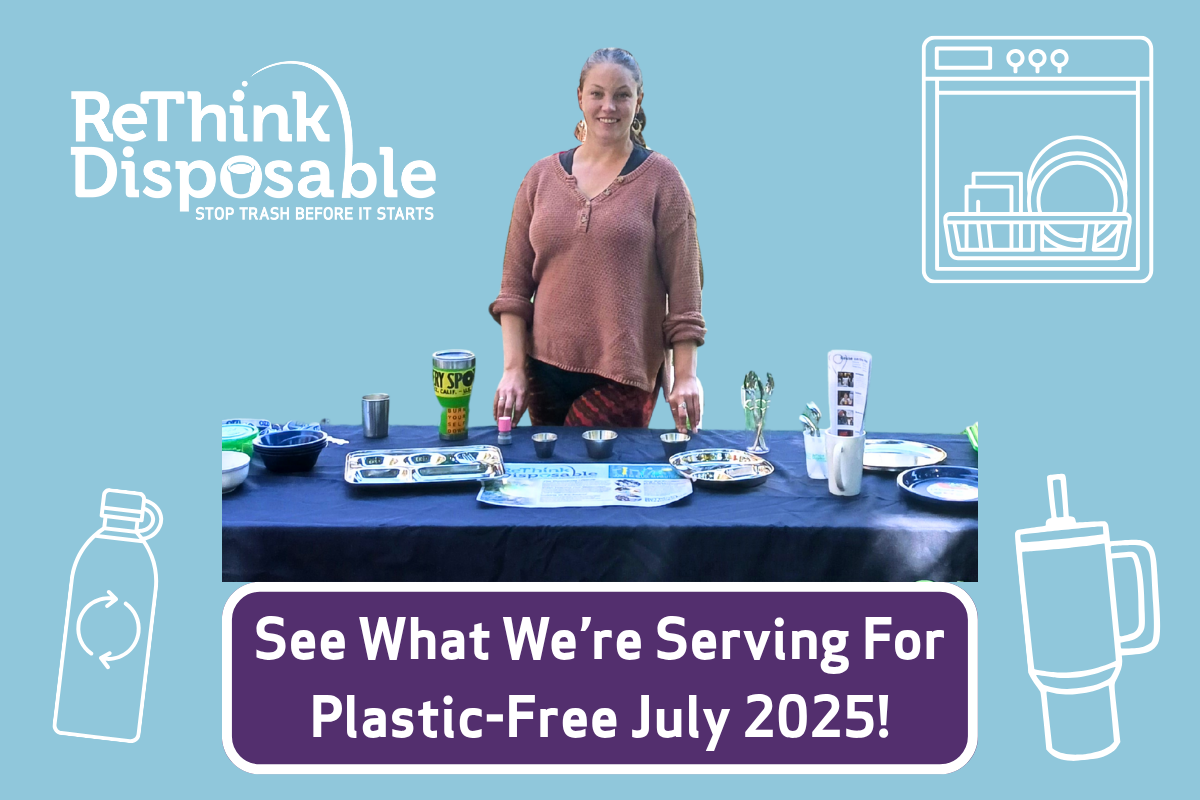
By Alison Correia, ReThink Disposable Summer Intern
Plastic has become ubiquitous. Our food ware and wrappers, clothes, furniture, cars, electronics, toys, homes, packaging, and countless other products contain plastic.
But all of this plastic comes with a heavy price. Because plastic doesn't decompose, every molecule of plastic produced since 1907 is still present in the environment today and we keep creating more! The United States alone generated over 35 million tons of plastic in 2018. All this plastic doesn’t just “go away” when you “throw it away.” It all ends up somewhere. Micro- and nano-plastics pollute our soils, waters, and air; they’re found inside of plants, animals, rainwater, the snow in Antarctica, and even our blood! Plastics are made from fossil fuels and release climate warming emissions at every stage of their lifecycle, and contain toxic chemicals including carcinogens, neurotoxicants, and endocrine disruptors.
What about recycling?
Unfortunately, scientists estimate that only about 9% of plastics generated annually are recycled. A big reason why is plastics are composed of many different types, colors, and chemical additives and are not easily sorted. Most plastic “recyclables” end up in landfills, incinerators, the ocean, and dumped on the doorsteps of developing countries.
The petrochemical industry touts “advanced recycling” or “chemical recycling” as solutions to our plastic waste problem. Don’t be fooled. “Chemical recycling,” is, first and foremost, a public relations strategy meant to distract from better solutions. Most of the facilities that have been built are actually “plastics to fuels” operations that melt plastics and extract low-grade liquid fossil fuels to be burned elsewhere. This is not recycling, and it keeps us hooked on plastic and fossil fuel consumption.
So what IS the solution?
We need to reduce the amount of plastic that is produced, used, and disposed of. Plastic Free July is an opportunity for individuals AND institutions to create real world examples of a future where we say “no” to throw away plastic culture.
Here are some tips for individuals to have a Plastic Free July and eliminate single-use disposable plastics from your daily life!
- At home: Use reusable dishes, utensils, cups, bottles, and wrapping. I save glass jars and cardboard oat containers to reuse for other food storage.
- Dining out: Bring your own container to pack up leftovers and tell the server, "No plastic straw, please."
- Ordering food to-go: "Skip the Stuff" and ask that disposable utensils etc. not be included in your take-out order.
- Shopping: Bring your own shopping and produce bags to the grocery store and prioritize products with less/no packaging. Shop at bulk and refill stores if you can.
- Make your own: Some pantry staples are really simple to make at home, saving you the plastic packaging AND money. Mayonnaise blew my mind: did you know it’s just whipped eggs, oil, and vinegar? And there is no need for countless cleaning products - nearly all your household cleaning can be done with just vinegar, lemon, and baking soda!
Ready to make it official? Join the movement by taking our ReThink Disposable Pledge to Reduce Single-Use!
Want to make a bigger impact?
Though reducing our plastic consumption is important, individual action alone cannot end the world's continued consumption of plastic. Together, we can multiply our impact! Through our ReThink Disposable campaign, we’re building examples of how restaurants, schools, and other institutions can implement Plastic-Free July year-round by helping them replace single-use disposable dining ware items with durable reusables. We invite you to nominate your favorite eatery to join ReThink Disposable! You can also sign up for our free Plastic Free July ReThink Disposable Webinar in July, to learn how to be a plastics activist in your community.
Our work is making a difference!
Clean Water's award-winning ReThink Disposable program has had some big recent successes helping New England schools transition away from single-use disposable plastics toward reusable trays and sporks, saving the planet while also saving schools money. In Rhode Island, Nuestro Mundo Public Charter School in Providence, as well as Brown Avenue Elementary School and Ferri Middle School in Johnston, have partnered with ReThink Disposable to eliminate disposable trays in their cafeterias. In Georgetown, Massachusetts, the two public schools ended the year with a soft launch of reusable trays across their cafeterias. Once fully implemented, this program will serve 1,000 students and prevent 180,000 single-use items from entering the waste stream, with savings estimated at up to $16,000 annually. In Connecticut, Stamford Public Schools are in early discussions about incorporating dishwashers and reusables in future cafeteria renovations, after seeing the success story of Middletown Public Schools’ switch to reusables.
This Plastic Free July, take stock of your consumer habits, strive to reduce your plastic consumption, spread the word, take action in your community, and speak out to your local government. Let's demand an end to the reign of “disposable” plastics and build a sustainable, reusable future!


